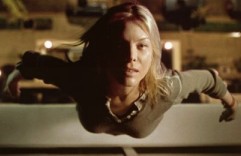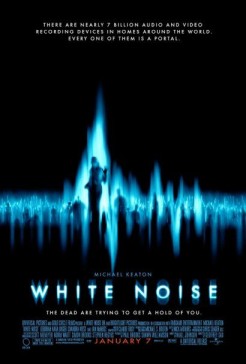|
White
Noise
Now comes time to reset the clock and start anew with 2005.
This means that, for the movie going public, a rocky road
lies ahead. It’s the drudges of January, best known
as dumping ground for “iffy” projects and stuff
films that didn’t pan out. It can be a long haul between
now and Spring, but occasionally we are rewarded with a
few surprises along the way. Not this time, folks.
It may
seem obvious, but White Noise is not a spark of
hope for the New Year. Instead, it’s one of those
painfully awful films that pushes too hard to the point
that exhausts viewers in the end. Every film needs it, but
any film requiring this much suspension of disbelief is
in serious need of a re-write. A wise Fanboy will use this
week to catch up on all those great end of the year 2004
films they missed out on.
Here
we are presented with EVP (Electronic Voice Phenomenon),
a notion that the dead can communicate with the living via
static in modern day devices. Admittedly, it was never necessary
to legitimize this in the first place. The videotape phenomenon
in Ringu or The Ring or the website used
in Kairo do not require justification to enjoy;
it's creepy enough to suggest that the dead are attempting
communication with the living through modern technology.
So why doesn’t it work here?
Because
White Noise wants so badly to be heralded
as an accurate depiction of “the real life phenomenon”
that when it shies away from any sort of concrete explanation
you lose your audience. Forget the ill-conceived plot points,
story arc, etc. The true problem lies in the posturing.
It would have been one thing to present the events and intrigue
your audience to believe them. An audience is there to be
entertained! They bought the ticket knowing it was a film
about ghosts, so you’re already halfway there right?
Nope. Instead, the filmmakers push to muster credibility
in a completely incredulous fashion. We open with quotes
and definitions on title cards, obviously used to implant
the feeling of authenticity. Yet simply quoting Thomas Edison
doesn’t do much good if the whole thing is taken out
of context. It would be far more effective to simply allow
the characters to discover these phenomena for themselves
and deal with the eeriness of implication, rather than half-hearted
explanation.
 |
The
film’s protagonist is recently re-married divorcee
John Rivers (Michael Keaton). Rivers is married to a woman
fondly referred to as “Babe” twice in the opening
sequence. We learn that “Babe” has to meet with
her editor and drop off John’s son, Mike (Nicholas
Elia), at school. To complicate matters, or just to pull
at our heartstrings, there is a reveal that “Babe”
may also be pregnant. John is elated, and Keaton’s
performance here as a prospective father is warming enough
to work.
It is
only after “Babe’s” car is found abandoned
and she has gone missing that we learn she is best selling
novelist Anna Rivers (Chandra West). Note to director Geoffrey
Sax and screenwriter Niall Johnson: If you want us to care
about a potential victim, let us at least know her name
before she goes missing so we have something to reference
her with aside from “that guys’ wife who might
be pregnant” or “Babe.” John spends the
better part of a week agonizing over his wife’s whereabouts
while the police plumb the body of water next to her car
searching for Anna, or any clues that lead to her fate.
John
is confronted by Raymond Price (Ian McNeice), an expert
in EVP who claims that Anna has contacted him from the “other
side.” This of course implies that she has died, and
John treats this assertion with contempt, as any husband
clinging to the hope that his missing wife may still be
alive would. Unfortunately, John’s hopes prove futile
and Anna’s body is discovered down stream from her
car. It is assumed that she slipped while trying to repair
a blowout and sustained a massive head trauma. The rising
current likely pulled her in and this is why she wound up
downstream. A series of strange encounters leads John back
to Raymond Price in hopes of contacting Anna beyond the
grave.
Raymond
specializes in recording white noise and using a computer
to enhance picture and sound qualities to achieve communication
with the deceased. Through Raymond, John learns more about
EVP and makes the acquaintance of grieving Sarah Tate (Deborah
Kara Unger). After Raymond is mysteriously murdered, John
delves into his own practice of EVP using TV sets, a computer,
and some VCRs to mimic Raymond’s work station. What
results is dangerous dalliances with “evil spirits”
who seek to wreak havoc on the living. This is all learned
when John visits a psychic who informs him of the great
risk involved in EVP. Just as we are getting used to EVP,
the film shifts to psychic phenomenon and begs us to accept
both as coinciding concrete practices. John believes his
wife is posthumously informing him of future events that
will result in the deaths of various people in his city,
so he stays the course playing hero and piecing together
clues to save lives and eschewing potential risks.
 |
The
whole thing nosedives in the end, likely in an effort to
seem in trend with the current popularity of Japanese horror
films that seem to have audiences enthralled lately. The
problem is White Noise was never on stable ground
to begin with. First of all, why would John, a celebrated
Architect and husband to a best selling novelist, continue
to rely on over-the-air reception for television and radio?
Their combined salaries are able to afford them extravagant
living quarters, nice vehicles containing GPS mapping systems,
remote controlled security gates, and high end wireless
phones, so why can’t they spring for Cable or Satellite
reception at least for television broadcasts? The answer
is simple: EVP, as a device, needs a means to sustain itself.
The
film is chock full of laugh inducing plot holes such as
this, and the outcome of the film is so lacking in disposition
and resolution that chuckles are unavoidable. Musical cues
drown out the “eerie voices from beyond,” stylistic
cuts are more annoying than anything else. This was an attempt
to “wow” gone wrong. The result is a failed
shot at being profound.
The
main concern here is saving your hard earned ducats, dear
Fanboys. You’d be better entertained (and frightened)
while starring at a snow-filled TV set for a good 5 minutes
straight with the lights off. Even then you’d be more
prone to send chills up and down your spine recalling that
classic TV snow scenario in Poltergeist than anything
in conjured up in White Noise.
Rating:

|








